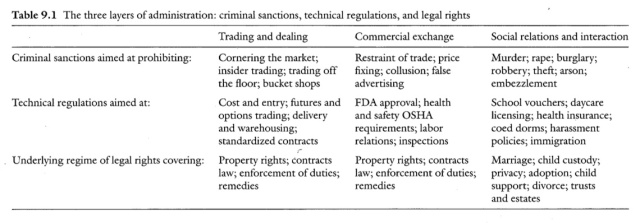I have a post at The Nation I hope you check out, Explainer: How Did Inequality in America Get So Bad? And What Can the Government Do to Fix It? (There’s an audio interview that goes with it.)
In the article I mention and use Dean Baker’s excellent new book, The End of Loser Liberalism: Making Markets Progressive (available as a free pdf). Some links: here is Jared Bernstein and Matt Yglesias each discussing it, and here is a two-part interview at Naked Capitalism (I, II).
There’s a wonky economics way to discuss it – how much does post-Volcker monetary policy have to do with the sluggish wage growth? How much does patents drive income upwards? How does the minimum wage and unionization impact inequality?
But for the critical theory geeks it connects to a much more important way of understanding what is happening in the economy and how to discuss it as progressives. Most of our discussion of inequality and the economy, following liberal political philosophy, assumes that the “market” is given. The big questions are how to split the pie afterwards and what people need as a baseline to participate in this already existing “market.” Hence a lot of fixation on transfers and taxation – things that the government does right after “the market” has taken place, because the government is something that hovers over it instead of constructing it.
But beneath this free-floating “market” is a series of government interventions. The very notion of property rights comes out of government coercion. Robert Hale, leader of the progressive assault on laissez-faire, noted in his 1923 essay, Coercion and Distribution in a Supposedly Non-Coercive State, that the “right of property is much more extensive than the mere right to protection against forcible dispossession…In protecting property, the government is doing something quite apart from merely keeping the peace. It is exerting coercion.”
Though Robert Hale didn’t live long enough to see the digital-rights management community, the man who wrote “The income of each person in the community depends on the relative strength of his power of coercion, offensive and defensive” would understand it completely.
In his book about neoliberal penalty, The Illusion of Free Markets, University of Chicago law professor Bernard Harcourt provides an “archeology of regulation.” In addition to the the regulations of legal rights that exist underneath the market, there’s the enforcement mechanisms on top of it, most visible for what it does (and doesn’t do). Then there’s a middle level of administrative rules, standards, and other technical details that exist, both public and private. A chart from Harcourt’s book, details these three levels with three examples: financial, commercial and social (click for larger image).
But to bring it back to Dean Baker’s book, how these are set-up have massive consequences for income gains, inequality and growth. And these battles – from who gets to vote on the supply of money in the economy to how corporation charters are setup to what constitutes “property” in the internet to what legal regimes constitute “free labor” – are battles that liberals need to be fighting harder on. Because these market setups are changing, and they have been changing in a way that exacerbates inequality, redirecting income upwards and leaving large parts of the economy behind, while those enacting it are claiming the idea that these regimes make markets more “free” instead of less. Baker’s book gives a roadmap to start fighting these battles.




Very good points here. I’d also emphasize that certain sectors have orders of magnitude more effect on inequality than others. Rules governing CEO compensation and hedge fund leverage are a lot more important than health care/education. (Except, perhaps, when thinks like LBO’s of hospital chains or massive cash-outs from for-profit colleges model those traditionally non-profit sectors on the for-profit mega-corp.)
Pingback: What I’m Reading Wednesday, November 23, 2011 | Rationally Thinking Out Loud
Legal realists made much of the “Baconian” nature of legal reasoning it attacked, but it threw out the baby with the bath water in arguing that therefore there was no truth, only pragmatism. At the same time it was an attack on classical social and economic equilibrium theory. Where a legal realist sees life as competitive, “Darwinist,” much as the struggle between plaintiff and defendant, equilibrium theory (perhaps taking after “the great chain of being”) sees everyone as having a place or role in society or they wouldn’t exist to begin with. There is no sense of a natural selection of random events according to what “works.” Rather the fitness is assumed from the start and it is the unfitness which is considered criminal. Morton Horwitz, who wrote a lot about this subject some decades ago, had this backwards. It is not will in the form of contract that classical thought upheld but reason and freedom. His problem, like all legal realists, is in seeing things entirely in this Social Darwinist context. Thus all property is theft, including that which as Locke said was in one’s own person. The antidote then must be communism as there is no in-between, no sense of a republic.
As for the source of inequality, it lies in the creation of credit, not in property, because by increasing the price of assets beyond which they would be if earned by ppl, they transfer wealth to the possessors of them.
Pingback: Live at Boston Review on Inequality, Rents and Occupy, Plus Some Comments on Three Types of Rent. | Rortybomb